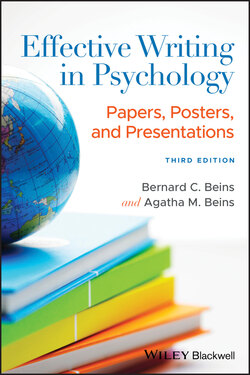Читать книгу Effective Writing in Psychology - Bernard C. Beins - Страница 10
Preface to the Third Edition
ОглавлениеA writing project is never really complete. We just decide that we are through with it or encounter a deadline. Anybody who has embarked on writing projects knows that there is always more to say; and, in retrospect, we invariably think of how it could have been better.
This book is no different. After the first edition, we spotted places where we thought we could have been clearer, our prose could have been crisper, and we could include new information. When we finished revising the book for the second edition, we tried to remedy the flaws that we saw in the first. (It's probably the case that nobody else saw a particular need to change things, but we did.)
For this edition, we again tried to improve the book. There are some topics that we thought were clearly in need of amendment. For example, how we describe certain groups of people has changed since the second edition; and because university library websites have changed, some of the guidance about searching for resources now seem obsolete. Revisions such as these are designed to ensure that our book continues to be a useful resource for your writing.
In addition, the American Psychological Association (APA) developed the seventh edition of its publication manual, necessitating significant revisions of the chapters on APA style. Some of the guidelines from previous versions of the manual represented an era when an editor may have had stacks of paper manuscripts that could become mixed up if not properly labeled. With electronic communication, some of those guidelines became irrelevant. This edition of our writing book presents the formatting that is most relevant to papers you are likely to write, but the full style manual contains much more information, and we encourage you to use it as a resource if you have a question or encounter a situation not covered in this book. We have tried to eliminate elements that you probably won't need to know about, which we hope should make it easy to find the information in the book that you need at any point in your writing.
We also found certain spots where, once again, we thought we could strengthen our writing and have tried to remedy those concerns. But as we noted at the beginning of this preface, the project is never really complete. We will undoubtedly spot aspects of this edition that, in retrospect, we would change. Nevertheless, we are confident that the book will provide you with the tools you need to produce high‐quality writing.
In creating this work, collaborating as a father/daughter team has once again been pure delight. It is rare to be able to combine the personal and the professional so wonderfully.
Finally, as with the earlier editions, the final product would not be complete without the work of the professionals at Wiley‐Blackwell, including Darren Lalonde, Monica Rogers, and Rajalakshmi Nadarajan.
